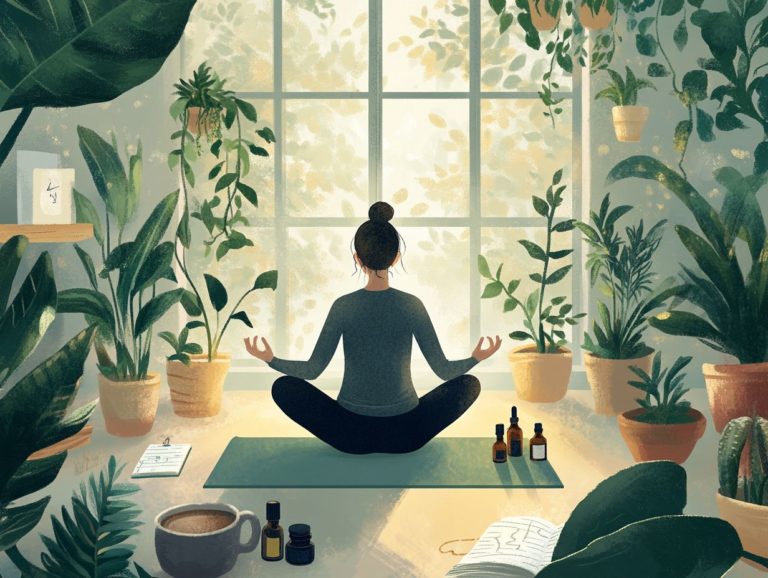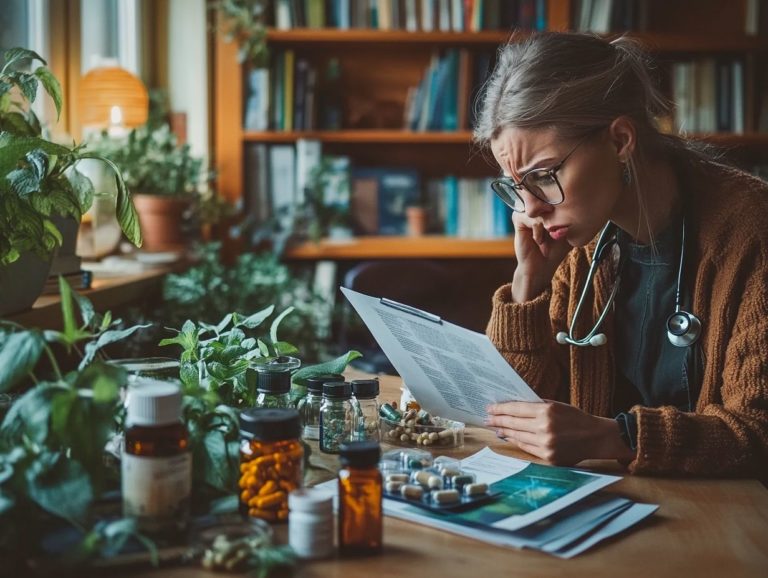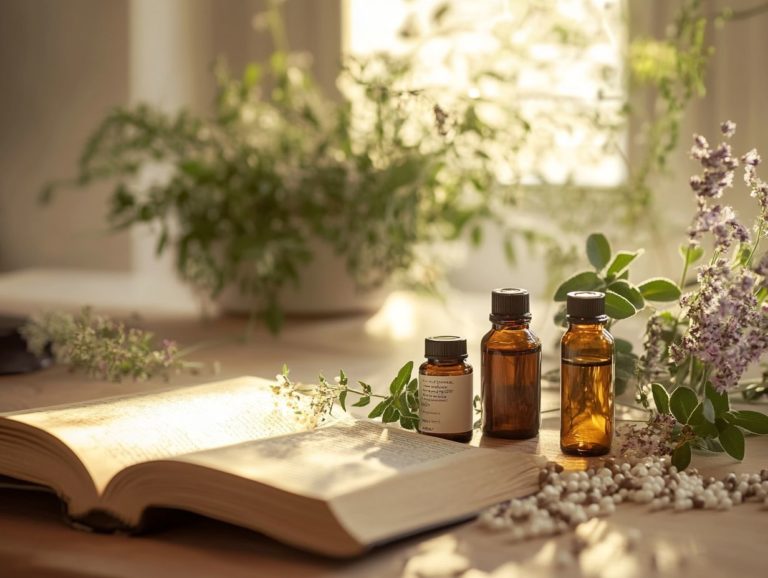Can Alternative Therapies Improve Mental Health?
In today’s fast-paced world, you may seek holistic approaches to enhance your mental well-being. Alternative therapies present a rich tapestry of options ranging from meditation and yoga to herbal supplements that can beautifully complement traditional treatments.
This article delves into various types of alternative therapies, highlighting their benefits for mental health and important considerations to keep in mind before you dive in. You ll discover how these therapies can work harmoniously alongside conventional methods, creating a more comprehensive approach to your mental wellness.
Join in as you uncover the potential of these alternative pathways.
Contents
- Key Takeaways:
- Understanding Alternative Therapies
- Benefits of Alternative Therapies for Mental Health
- Considerations Before Trying Alternative Therapies
- Common Alternative Therapies for Mental Health
- Combining Alternative Therapies with Traditional Treatments
- Frequently Asked Questions
- Can alternative therapies improve mental health?
- What are some examples of alternative therapies for improving mental health?
- How do alternative therapies improve mental health?
- Are alternative therapies a substitute for traditional mental health treatment?
- Are alternative therapies scientifically proven to improve mental health?
- Are there any risks associated with alternative therapies for mental health?
Key Takeaways:
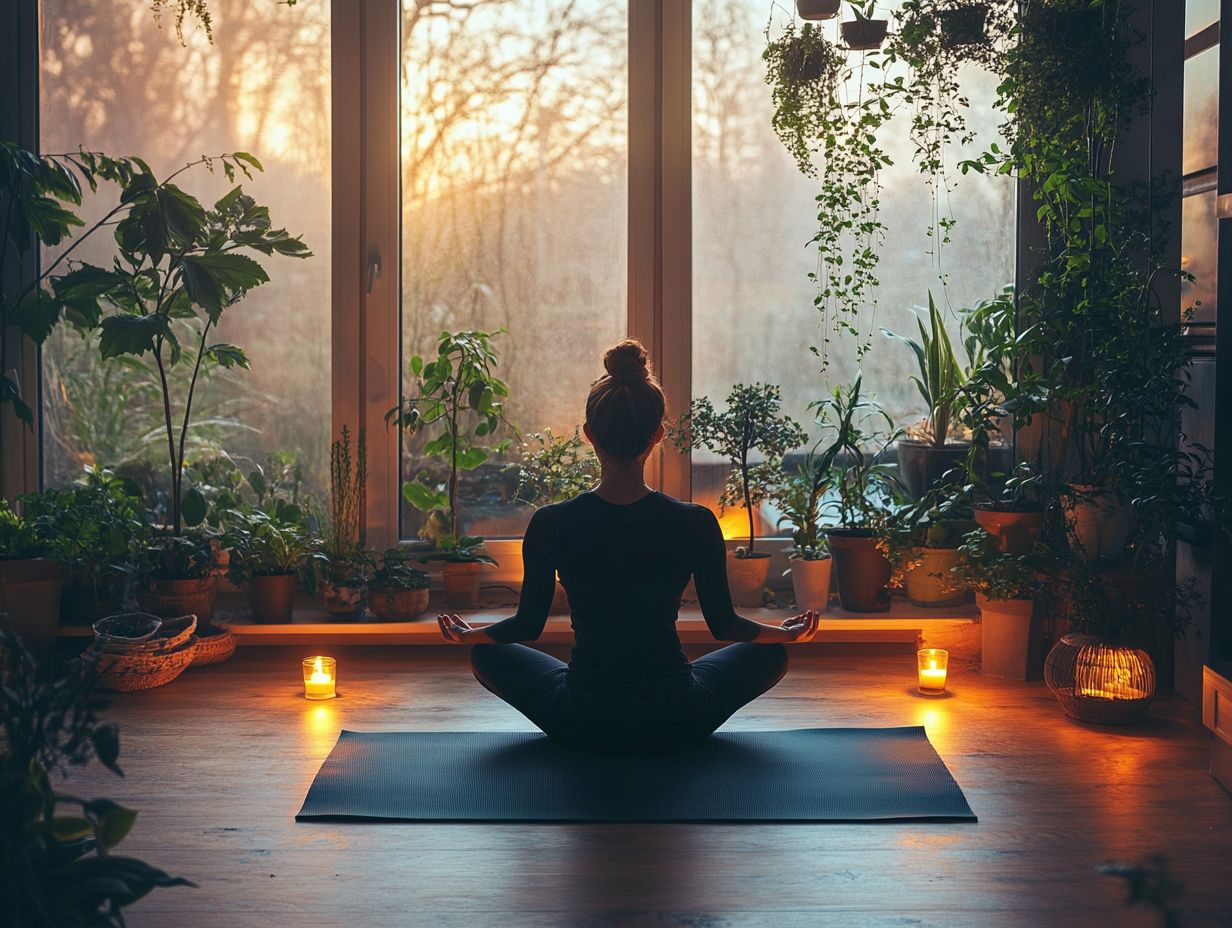
- Consult a healthcare professional before trying new therapies.
- Integrate alternative therapies with traditional treatments for better results.
- Discover the transformative potential of holistic approaches today!
Understanding Alternative Therapies
Understanding alternative therapies is essential for anyone seeking effective treatment options for mental health concerns. This includes issues like major depression and anxiety disorders.
As research continues to grow and support various methods, these therapies can serve as valuable complements to traditional approaches like psychotherapy and Western medicine.
The Cleveland Clinic emphasizes the importance of exploring alternative therapies to enhance psychological well-being and overall health, providing hope for those navigating the challenges of mental health.
Types of Alternative Therapies
You ll find a variety of alternative therapies tailored to meet mental health needs. Each offers distinct paths to treatment and well-being. Think herbal supplements, meditation, yoga, and acupuncture all designed to cater to your unique journey.
These therapies emphasize holistic healing, addressing not just the symptoms but also the root causes of anxiety, depression, and stress.
For instance, herbal supplements have gained a reputation for supporting mental clarity and emotional balance. Ongoing research sheds light on their effectiveness.
Yoga merges physical exercise with mindfulness techniques, promoting relaxation and fostering a profound connection between your mind and body.
Acupuncture has proven effective by alleviating symptoms of various mental health conditions through stimulation of specific points on the body. This showcases the diverse, research-backed methods you can explore to enhance your overall well-being.
Benefits of Alternative Therapies for Mental Health
The benefits of alternative therapies for mental health are abundant, especially when it comes to alleviating symptoms of major depression and anxiety disorders. These approaches not only target specific issues but also enhance your overall well-being through a holistic lens.
By embracing these therapies, you open the door to a more balanced and fulfilling emotional state.
Reducing Symptoms of Mental Illness
Alternative therapies have emerged as promising avenues for alleviating symptoms associated with mental illnesses such as major depression and anxiety disorders, offering effective treatment options for many individuals like yourself.
Recent studies underscore the benefits of practices such as mindfulness meditation, yoga, and acupuncture.
- One analysis demonstrated that individuals who practiced yoga experienced a remarkable 30% reduction in anxiety symptoms compared to those receiving standard care.
- A meta-analysis of mindfulness-based stress reduction programs revealed that participants reported a significant decrease in depressive symptoms, solidifying the growing endorsement for these methods.
- Acupuncture has proven effective in enhancing mood and reducing anxiety levels in various clinical trials, establishing it as a valuable complementary therapy for those navigating these persistent mental health challenges.
Improving Overall Well-being

Improving your overall well-being is vital for mental health recovery. Embracing alternative therapies like yoga, exercise, and meditation can significantly contribute to this journey.
These practices target anxiety and depression while cultivating a holistic sense of health. For instance, yoga merges physical postures, breath work, and mindfulness to reduce stress and enhance emotional regulation.
Meditation helps you gain mental clarity and emotional stability. This equips you to tackle daily challenges with greater ease.
Engaging in these activities leads to heightened self-awareness and resilience. Both are essential for maintaining long-term mental health.
Incorporating these alternative therapies into your routine creates a harmonious approach to wellness. This beautifully connects your mind, body, and spirit.
Considerations Before Trying Alternative Therapies
Before you explore alternative therapies, weigh several important factors. Start by consulting a healthcare professional to ensure the method aligns with your mental health needs.
Your well-being deserves careful consideration and expert guidance for effective treatment.
Consulting with a Healthcare Professional
Consulting a healthcare professional is vital when exploring alternative therapies for mental health issues like clinical depression. They offer personalized guidance and support that can make all the difference.
These experts assess your condition’s severity and recommend evidence-based treatments tailored to your unique needs. They suggest therapies with proven effectiveness based on the latest research.
By monitoring your progress and adjusting treatments, professionals ensure a safe pathway toward recovery. This minimizes risks from self-treatment or unverified methods.
Common Alternative Therapies for Mental Health
Common alternative therapies for mental health include meditation, yoga, acupuncture, and herbal supplements. Each offers distinct benefits that enhance emotional and psychological well-being.
Embracing these approaches cultivates a holistic sense of balance and tranquility in your life.
Meditation and Mindfulness
Meditation and mindfulness can transform your mental health. These practices foster awareness and alleviate stress, inviting you to immerse yourself in the present moment.
Studies show that mindfulness can significantly lower anxiety levels and elevate your mood. For example, a review in a respected journal found mindfulness interventions effectively reduced depression symptoms.
Techniques like guided imagery and loving-kindness meditation usher in relaxation and deepen your connection with your thoughts and feelings. As more individuals explore these practices, research consistently highlights their positive impact on mental health.
Acupuncture
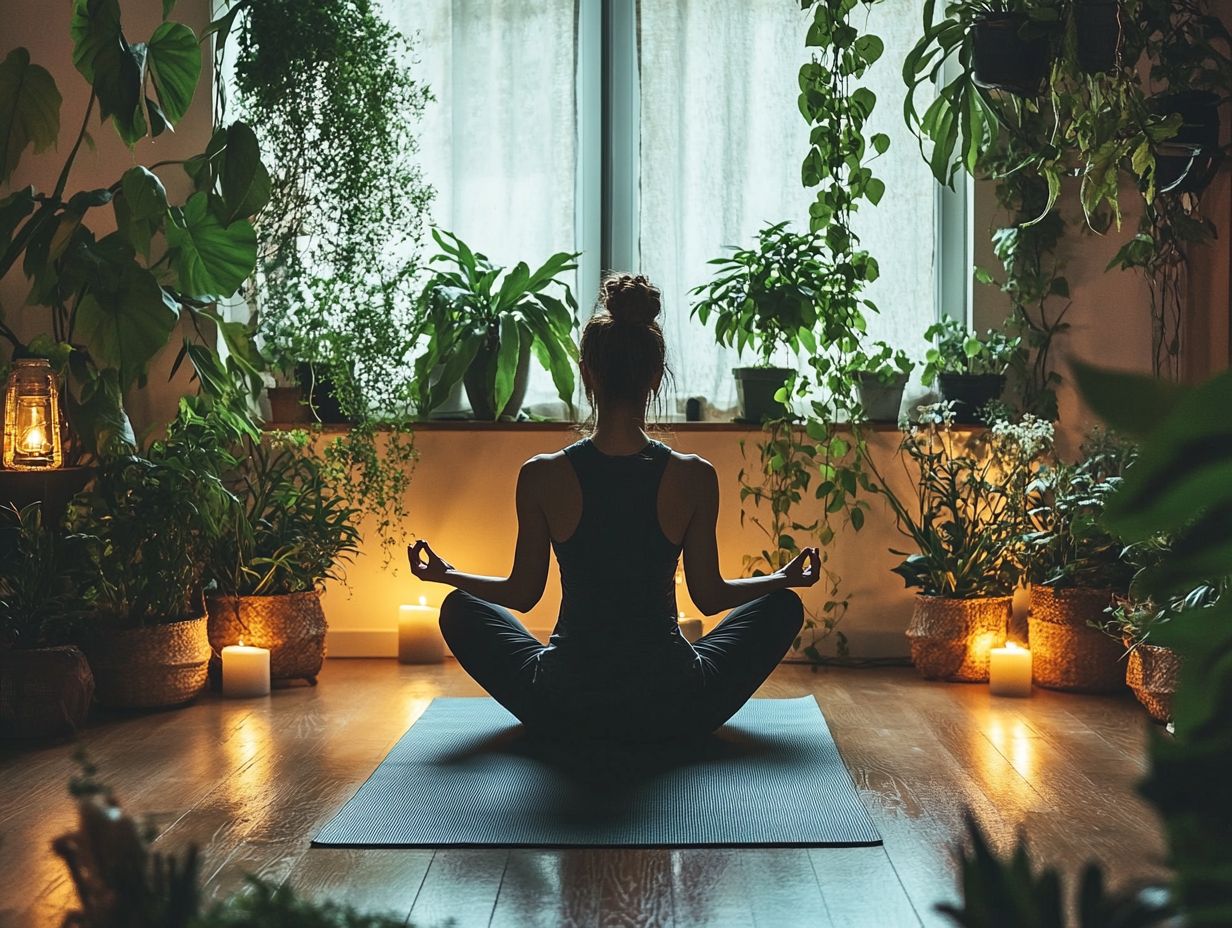
Acupuncture is an ancient alternative therapy that involves the precise insertion of needles into specific points on your body. It has proven to be an effective treatment for various mental health issues, including clinical depression.
Rooted in the principles of Traditional Chinese Medicine, this technique operates on the belief that the flow of energy, or ‘qi,’ through your meridians plays a significant role in your overall health.
By strategically placing needles at exact points, the therapy aims to restore balance and enhance your mental well-being. Research shows that acupuncture can boost neurotransmitter function and reduce inflammation in the body, helping to alleviate symptoms of anxiety and depression.
Clinical trials indicate that individuals receiving acupuncture often report notable improvements in their mood and stress levels. This supports the idea that integrating acupuncture with conventional treatments can lead to better mental health outcomes for you.
Yoga
Yoga is a diverse practice that beautifully merges physical exercise, breathing techniques, and mindfulness. All of these significantly enhance your mental health and overall well-being.
This varied approach strengthens your body while cultivating a profound sense of inner peace and emotional stability. Many practitioners discover that regular yoga sessions help alleviate feelings of anxiety and depression, serving as a powerful ally in stress reduction.
By honing in on breath control and meditation, you can foster greater self-awareness, which in turn leads to improved emotional balance. The mindful movements inherent in yoga promote relaxation and facilitate the release of pent-up tension, making it an invaluable resource for navigating the complexities of modern life.
Herbal Supplements
Herbal supplements, like omega-3 fatty acids and kava, are increasingly acknowledged as alternative therapies that hold promise in tackling mental health challenges, including clinical depression. These natural remedies are becoming popular among those seeking a more integrated path to health.
Omega-3 fatty acids, abundant in fish oil, are recognized for their properties that reduce inflammation in the body and have been associated with enhanced mood and cognitive function. On the other hand, kava, derived from a plant native to the Pacific Islands, is often sought after for its calming effects, which can significantly alleviate anxiety.
Ongoing scientific research continues to investigate the benefits of these supplements. Promising findings warrant further exploration into their role within the mental health landscape. While they shouldn’t replace traditional treatments, these herbal options can effectively complement existing therapeutic strategies, enriching your journey toward mental wellness.
Combining Alternative Therapies with Traditional Treatments
By integrating alternative therapies with traditional treatments, you can create a more holistic approach to mental health. Combining these therapies boosts effectiveness and promotes well-being for individuals facing a variety of conditions.
Benefits and Potential Risks
While there are numerous benefits in combining alternative therapies with traditional treatments for mental health care, it s essential to remain aware of the potential risks that come with these practices.
Integrating various therapeutic approaches leads to a more personalized care experience, enhancing your overall well-being and addressing your specific needs.
Complementary methods like mindfulness, acupuncture, or herbal supplements can improve your emotional resilience and foster a greater sense of control over your mental health journey.
However, it s vital to stay vigilant about possible contraindications that could arise, such as interactions between medications and alternative treatments. Consulting healthcare professionals is crucial to ensure that these combinations are both safe and effective.
Remember, not all practices may be suitable for everyone, and some could even exacerbate underlying conditions.
Frequently Asked Questions
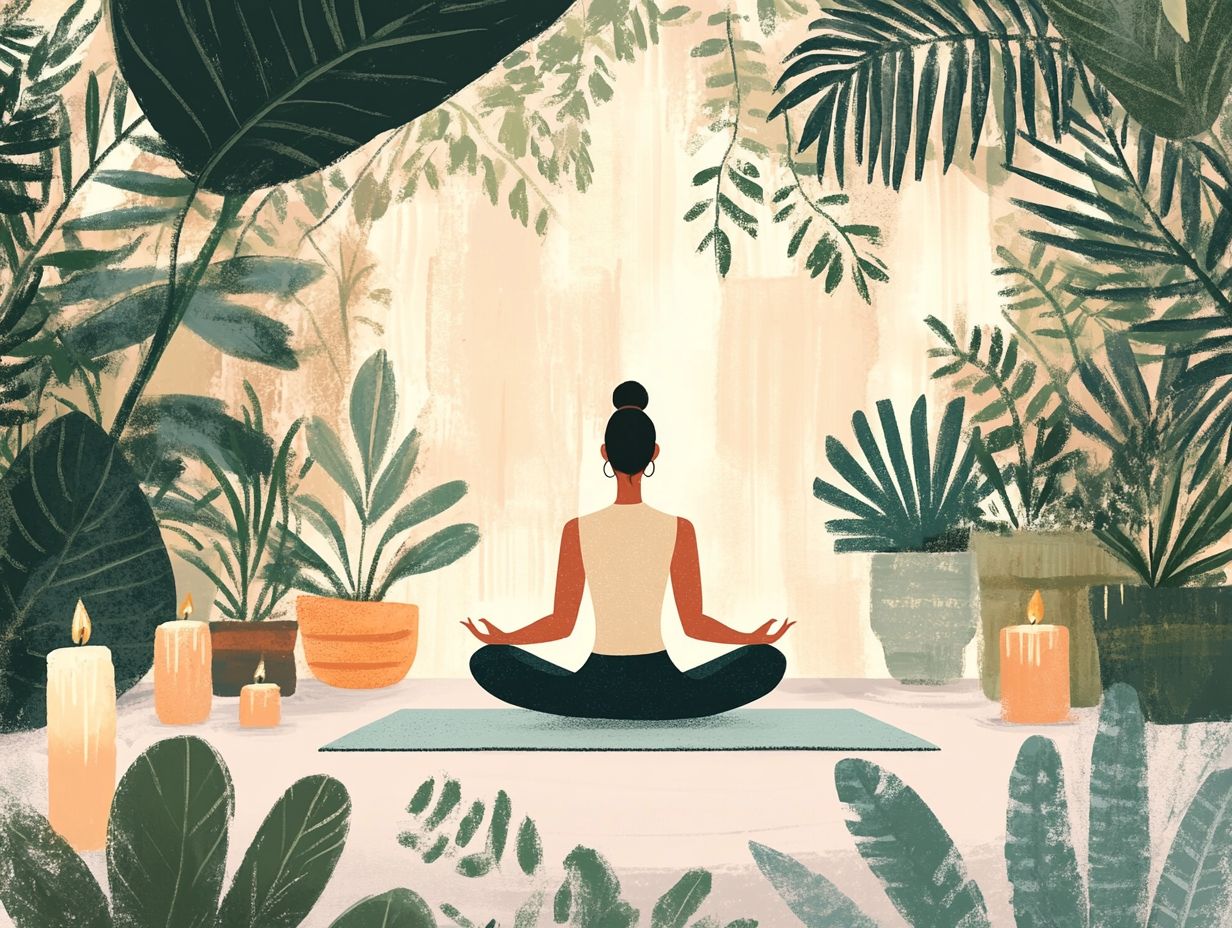
What is acupuncture?
Acupuncture is a therapy that involves inserting thin needles into specific points on the body to promote healing and balance.
How can yoga help mental health?
Yoga combines physical movement with breathing techniques and mindfulness, which can significantly reduce stress and anxiety.
Are herbal supplements safe?
While many herbal supplements can be beneficial, it’s important to consult with healthcare professionals to ensure they are safe and appropriate for your condition.
Can I combine alternative and traditional treatments?
Yes, combining them can enhance effectiveness, but it’s essential to consult with healthcare providers to manage risks effectively.
Can alternative therapies improve mental health?
Yes, alternative therapies can improve mental health. They provide a holistic way to treat mental conditions and can raise the question of whether children can benefit from alternative therapies as well, enhancing overall well-being.
What are some examples of alternative therapies for improving mental health?
Some examples of alternative therapies include acupuncture, meditation, aromatherapy, art therapy, and herbal supplements. These options can help in different ways.
How do alternative therapies improve mental health?
Alternative therapies promote relaxation and reduce stress. They can also boost self-awareness and improve physical health.
Are alternative therapies a substitute for traditional mental health treatment?
No, alternative therapies shouldn’t replace traditional treatments. They can complement regular care, but always consult a healthcare professional before changing your treatment plan.
Are alternative therapies scientifically proven to improve mental health?
Some alternative therapies may help mental health, while others lack solid scientific backing. It’s wise to research and talk to a healthcare professional before trying them.
Are there any risks associated with alternative therapies for mental health?
Like any treatment, alternative therapies carry risks. Always consult a healthcare professional and research the therapy before use, especially if you take medications or have specific health conditions.
Explore alternative therapies with the guidance of a professional to find the best options for your mental health!

